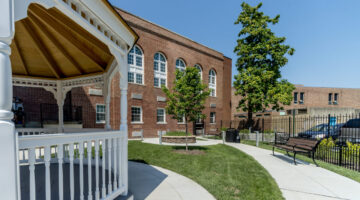


PACE and Phyllis Wheatley YWCA rehabilitation
Main objectives of the project
Washington, D.C. is addressing the significant deferred maintenance requirements and the challenge of high utility bills faced by affordable housing properties and non-profits. Through the implementation of Property Assessed Clean Energy (PACE) financing in affordable housing projects, the city is making sustainable upgrades accessible to an underserved market. This initiative demonstrates that green retrofits and housing affordability can complement each other effectively.
Date
- 2018: Finalista
- 2016: Construction
Stakeholders
- Promotor: Dantes Partners
- US Department of Housing
- Washington DC Mayor
- Architect: Miner Feinstein Architects
Location
Country/Region: United States of America, Washington D.C.
Description
The property assessed clean energy (PACE) model represents an innovative approach to financing energy efficiency and renewable energy enhancements on private property. PACE financing, commonly established within a "land-secured financing district," akin to an assessment district or local improvement district, typically involves local government-issued bonds for projects like streetlights or sewer systems. Recently extended to encompass energy efficiency and renewable energy initiatives, this model allows property owners to undertake improvements without substantial upfront costs. Participants in a PACE program, opting in voluntarily, repay improvement expenses over a defined period—typically 10 to 20 years—through property assessments, secured by the property itself and billed as an addition to property tax obligations.
Although PACE financing is accessible across much of the USA, the Phyllis Wheatley YWCA project stands out as the first instance where it has gained approval for a Department of Housing and Urban Development-assisted mixed finance public housing property. By synergizing with affordable housing subsidies, this pioneering mechanism facilitates the preservation of low rents, ensuring the property's sustained status as public affordable housing for a minimum of 40 years, all while reducing its environmental impact.
The Phyllis Wheatley YWCA, a nationally registered historic edifice, fulfills the needs of marginalized women by providing secure housing and counseling services. Originally erected in 1920 and significantly renovated in the early 1990s, the building is experiencing resident attrition. While only 30 units retain full amenities, thanks to the rehabilitation the rest now have shared shower rooms and kitchens on each floor, each unit now includes a toilet and sink. Additionally, the restoration of the first-floor common areas to their historic splendor entails the removal of current utilitarian finishes. Thanks to PACE financing, newly installed photovoltaic systems, sophisticated computerized control integration for mechanical and electrical systems, and stormwater management solutions optimize the building's technological efficiency.
Washington DC exemplifies how national programs can be used to maintain social housing and improve them. Benefiting from what was once thought for private owners can lead to useful results for the public administration, too. The result is the enhancement of a historic social housing building in a gentrified neighborhood, generating a more diverse and vivid environment also in the surrounding community.
This project was completed in December of 2016 and won 3rd place in the renovation category for the Affordable Housing Conference of Montgomery County Design Awards, 2018.

